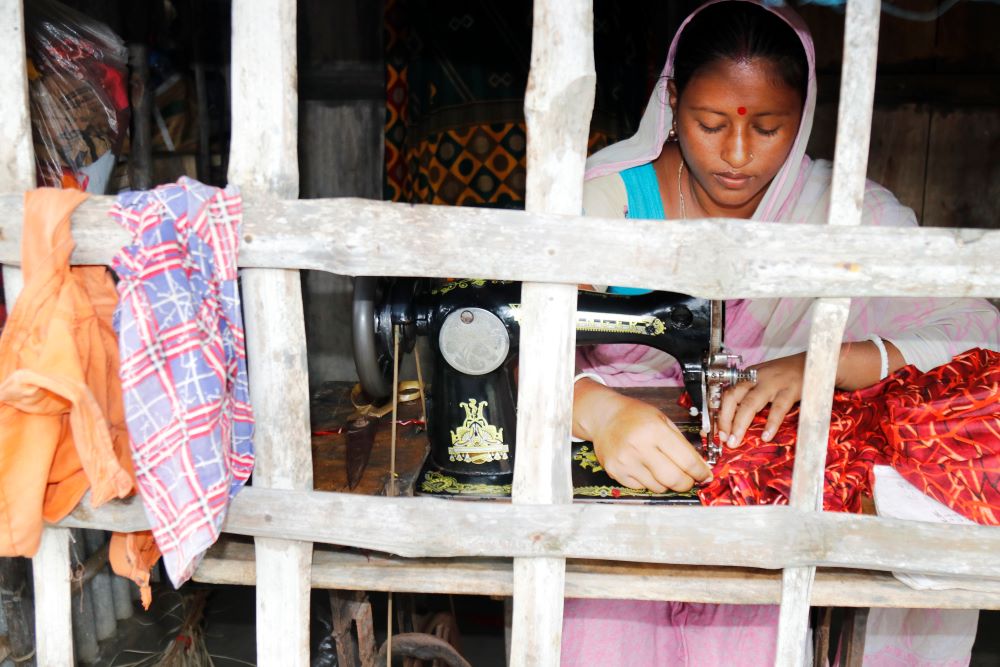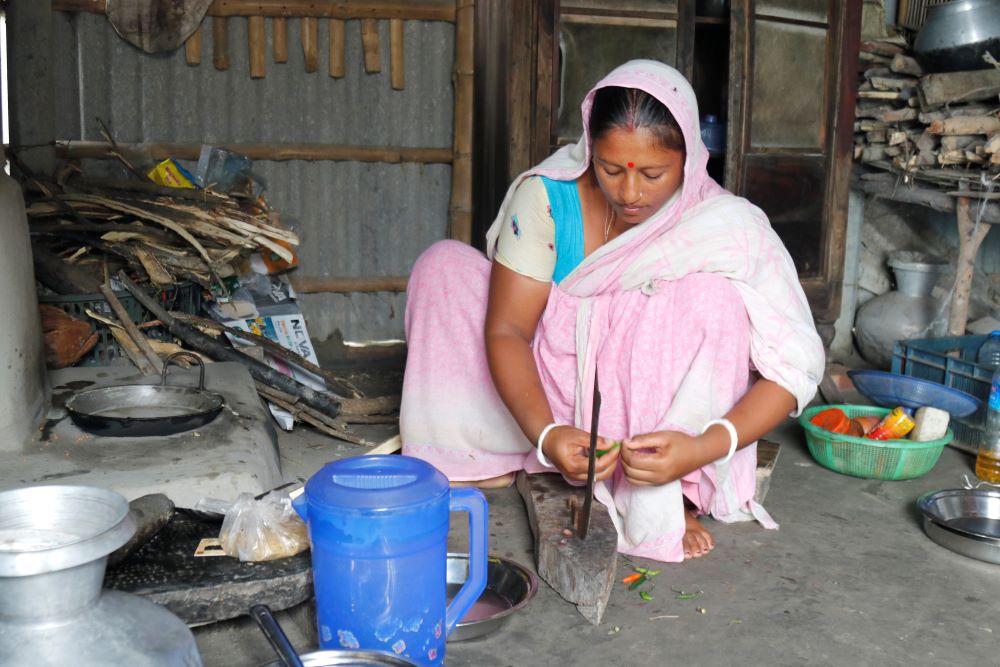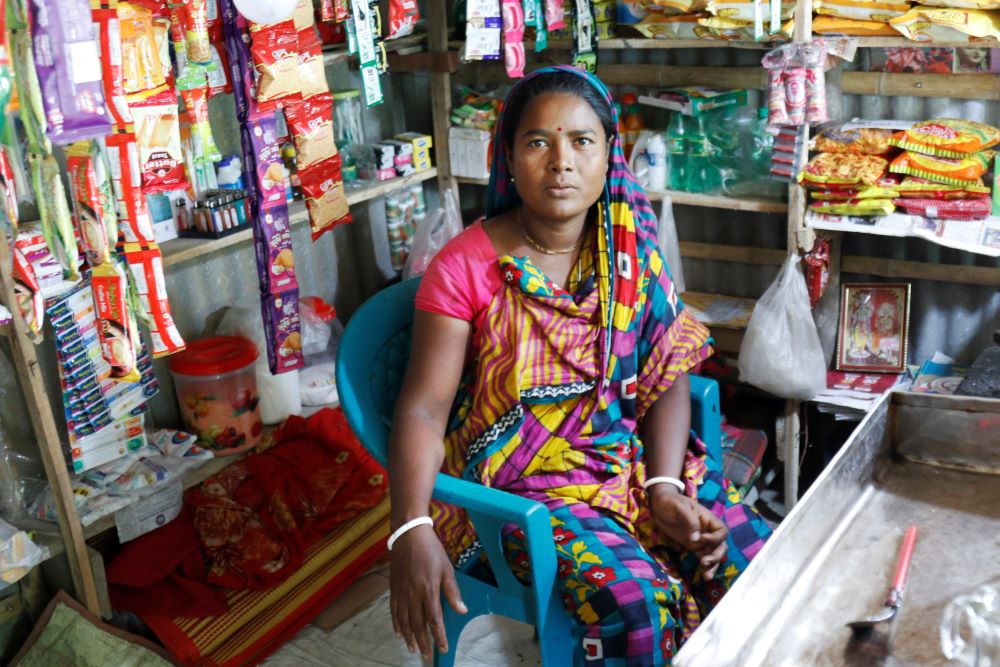
With the help of Caritas Bangladesh, Lipika Rani Gain bought a sewing machine and now works as a tailor. Caritas Bangladesh is working with 450 families at risk of migration and trafficking (Stephan Uttom Rozario)
When Super Cyclone Aila hit Bangladesh in May 2009, the house of Rekha Rani and Alan Goldar and their two children was swept away. About 500 people died in the cyclone. The Goldar family survived, but like thousands of people in the coastal area, the long-term climate and economic impacts of such a storm led to hardships, including reliance on moneylenders through an arrangement that has been compared to modern slavery.
After living with relatives for a year after Aila hit, the Goldar family moved into a one-room house in a shelter project provided by the Bangladesh Rehabilitation Assistance Committee (BRAC), a non governmental development organization. Now in Burigoalini, a village of the Shyamnagar subdistrict of Satkhira, in the southern Sundarbans area about 390 kilometers from Dhaka, the capital of Bangladesh, Alam caught fish in the river and worked in a brick kiln. Rekha Rani often fished in the river, too, and also worked as a day laborer on agricultural land.
But due to climate change, salinity has increased and made agriculture unproductive, leaving people unemployed. Then they take money from moneylenders with high interest. According to Caritas and to local families, sometimes the interest rate is as high as 15% per month. Many promise to repay the money through work in brick kilns and become bound to the moneylenders. They have no freedom.
'There is water all around but there is no water for food, the water is rising higher during the tide, the crops are not growing in the land and fish are not available in the river.'
—Suman Malaker
"According to the law of Bangladesh and the international labor law, a laborer will work for a maximum of eight hours a day, but when these poor people are taking money in advance, they are working as long as the owner wants. Even though he is sick, he is working. This is what we call modern slavery," said Suman Malaker, a program officer of Caritas Bangladesh, the social service wing of the country's Catholic bishops' conference.
Caritas Bangladesh is working with 450 families at risk of migration and trafficking with funding from the Catholic Agency for Overseas Development (CAFOD). Through this project, the families can increase their income with financial support and training, reducing the need to migrate or to depend on moneylenders.
Rekha Rani told EarthBeat that her husband's work in the brick kilns was hard. "I used to send a man to the brick kiln, but after coming back, I didn't recognize my husband. If the skin becomes black, the health is completely down," Rekha Rani recalled. With tears in her eyes, she said he would work from 3 a.m. to 9 p.m., with "no holidays of any kind" and no treatment for sickness.
Because there is no work in the coastal region for about five months a year, people like the Goldars are forced to take money in advance from moneylenders, like the owners of brick kilns. If they complete the work, they receive the other half of the payment. Each gets about 100,000 taka ($911.56) for six months.
According to research conducted by Caritas Bangladesh, at least 10,000 families are victims of this modern slavery in the Shyamnagor sub-district where more than 100,000 families live. In other words, 1 of 10 families are victims.

Lipika Rani Gain cooks for four family members in a small kitchen with a clay oven on Aug. 26. After Super Cyclone Aila, her family lived for a year living in temporary shelters, then the family received funding to build a house on government property near the Chuna River. (Stephan Uttom Rozario)
Alam did not return to the brick kiln this year. Now he goes to the river to catch fish, while Gain
"The money that Caritas gave was only used for the shop's goods, but the money needed to build the shop structure had to be borrowed. Around 40,000 taka ($364.62) has been spent to make the whole shop," Rekha Rani told EarthBeat in her shop.
Daily income is about 300 taka ($2.73), excluding expenses. With the income of two people, life is going better than before, Rekha Rani said.
Others in the area have had similar experiences. Lipika Rani Gain's life was also altered by Super Cyclone Aila.
"On Aila's day, all the houses were destroyed," she said. "Water was running through the room. We were tying the cot to the tree to prevent it from being swept away by the current."
Rekha Rani Goldar stands with her husband, Alam, at their one-room home, where they live with two sons, Aug. 26. Rekha Rani runs a small shop, thanks to funding and training provided by Caritas Bangladesh.(Stephan Uttom Rozario)
After a year living in temporary shelters, Gain and her family received funding to build a house on government property near the Chuna River in the Satkhira district. She and her husband, Sanjay, were previously both day laborers, but with the support of Caritas Bangladesh, Lipika Rani is now a tailor.
"Caritas taught me tailoring and bought me a sewing machine. Later, Caritas gave me 16,000 taka ($145.85) with which I bought more clothes and made and sold women's reading clothes," Lipika Rani told EarthBeat
Now, the couple's monthly income is about 7,000 taka ($63.81) and "is enough to sustain life," said Lipika Rani, adding that her younger son wants to become a doctor, and her elder son wants to become a schoolteacher. "I don't know if the dream will come true, but I will try," she said.
"I want to build a tailor shop in the market, but I am always afraid that this house on the bank of the river will also be destroyed by the cyclone," said Lipika Rani.

Rekha Rani Goldar sits in her shop in the Shyamnagor subdistrict of the Satkhira district in a coastal area of Bangladesh on Aug. 26. She previously fished and sometimes worked as an agricultural day laborer. (Stephan Uttom Rozario)
Bangladesh is a densely populated country in South Asia with 17.33 million people. Millions live in low-lying coastal areas like Satkhira. Due to its geography and topography, Bangladesh is highly vulnerable to flooding and other climate-related disasters. The country experiences cyclones, floods and salinity into the agricultural lands and water resources.
According to climate analysts, Bangladesh may lose up to 17% of its land by 2050, displacing millions of coastal people and causing severe economic losses.
Malaker, the Caritas officer, has worked closely with these communities in the southern part of the country for six years.
"We are getting a preview of the environmental disaster ourselves," Malaker, an agriculturalist, told EarthBeat. "There is water all around but there is no water for food, the water is rising higher during the tide, the crops are not growing in the land and fish are not available in the river. All these are signs of environmental destruction."
Advertisement
Nayan Sarkar, an environment and climate activist and the chief coordinator of Save Future Bangladesh, said the effects of climate change are visible around the world.
"We are currently in the middle of a major crisis, which is the climate crisis. World leaders are prolonging the climate crisis by not taking urgent climate action. In the last 20 years, each family in the southern region of Bangladesh has suffered an average financial loss of 462,000 [taka] ($4,211) due to natural calamities. We want damages now. We want climate action and climate justice," Sarkar told EarthBeat.
However, people in the southern part of Bangladesh — like the Goldars and Gains — did not want relief after the cyclones. They wanted protection before damages.
"The money that Caritas gave us was not much, but it gave us courage. We now know about modern slavery. We are now able to live happily and peacefully," Rekha Rani said. "I want everyone on the coast to live in peace."
Malaker is hopeful Caritas' beneficiaries will no longer fall into modern slavery or feel forced to migrate, but the financial support Caritas can provide is not enough to change the scenario across the whole region. That massive change needs more finance and a long-term plan.







